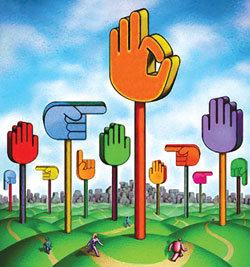 Washington DC: The Nepali diaspora has a lot to think about, and a lot to think. Those whose favourite pastime was Gyanendra- or Girija-bashing have few punching bags left, and they aren't quite brave enough to lambaste Pushpa Kamal Dahal. But this dilemma of sorts is perhaps leading them to look for more positive ways to engage with their home country.
Washington DC: The Nepali diaspora has a lot to think about, and a lot to think. Those whose favourite pastime was Gyanendra- or Girija-bashing have few punching bags left, and they aren't quite brave enough to lambaste Pushpa Kamal Dahal. But this dilemma of sorts is perhaps leading them to look for more positive ways to engage with their home country.
Although the 'visa gods' in Kathmandu reject many, there are more Nepalis outside the country now than there used to be. They work in hi-tech industries, manage restaurants and gas stations, they're in the medical and teaching sectors, and the diaspora's profile is getting more diverse by the year. And while they discuss Hillary Clinton vs Barack Obama, integrated as they are in their new world, they're also interested in the political world in Nepal.
A section of Nepalis I have met here seems to think that there are fewer opportunities for them to engage with their home country post-April Uprising, with the entering of the Maoists into the mainstream, and now the larger debates about the constituent assembly, federalism, and republicanism. The vehement and critical voices that filled the blogs are now falling short of pointers on how to improve Nepal's growth and development. It's difficult to be an expert on Nepal's problems when political developments move so rapidly, that many perspectives are fast outdated.
Thankfully, though, some people are trying their best. They might organise e-seminars like the Nepal Study Center at the University of New Mexico does, or conduct regular discussion programs like the Chalphal groups in London and Boston. Some mid-career Nepalis who have spent less than a decade outside Nepal are contemplating returning, as they look at the successful and gratifying careers of those who came back in the 1990s.
The main obstacle to people acting on this otherwise good idea is domestic, rather than anything to do with career prospects, opportunity, or money. Women who lead independent lives and have established their own identity tell the Beed that they do not want to return to be primarily obedient daughters-in-laws.
Similarly, school-age children don't want to give up their perceived elite but in fact easier education. The tales of the tough South Asian education are legion, and not everyone wants to deal with it.
NRNs are getting wealthier, and half-a-million or million dollar houses and apartments don't raise too many eyebrows. The lifestyle of bidesi Nepalis is also changing, holidaying and hobbies are climbing up the priority list. Most importantly, they are now inclined to invest in Nepal. But they find that there simply aren't suitable instruments that will give them the security of mitigating the fluctuation in exchange rate. The state would do well to see them as an economic force to reckon with.
The issues of Non-Resident Nepalis are broader than those highlighted by special interest groups and established cartels. The debate should be expanded now to create space not just for all Nepalis at home, but also for those who live abroad and have a strong connection to their Nepali identity. It'd be great to hear solutions for how to do this from bidesi Nepalis too.



